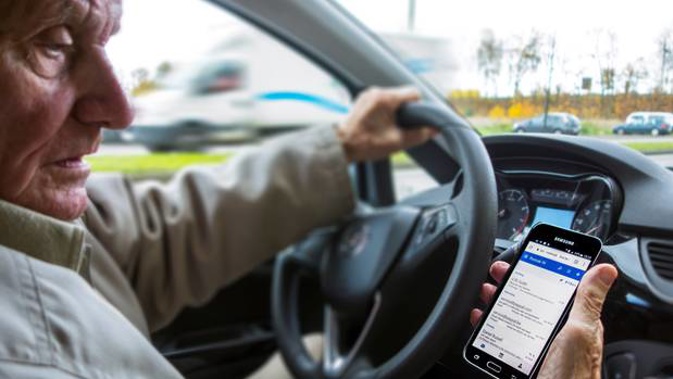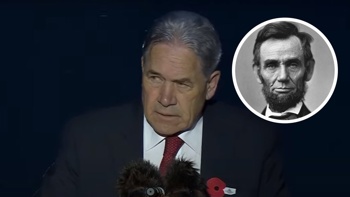
Heftier fines could be on the cards for Kiwi drivers using cellphones as our Aussie counterparts set a precedent by more than doubling their fines.
Under new laws, Queensland drivers who use their phones while behind the wheel could be hit with a A$1000 ($1045) fine on the spot. If they get caught a second time, they risk losing their licence.
The new fine is more than double the current A$400 fine for anyone who gets caught using a phone while driving on Queensland roads.
Currently in New Zealand, drivers who are caught using a hand-held mobile phone get an $80 fine and 20 demerit points, but the Automobile Association says it would like us to follow suit.
Road safety spokesman Dylan Thomsen said the NZ Government also needs to be looking at higher penalties, as well as increased enforcement and education.
"We did a survey last year which showed that our members regard drivers using cellphones as one of the road safety risks they were most concerned about.
"It's something people would like to see more action happening on because they don't think enough is being done," he said.
Surveys also found that about 15 per cent of AA members admit to having recently used a phone illegally while driving.
"Most people are aware of the law and know it's illegal, but they still do it and they get away with it so in their mind they think it isn't that risky or dangerous."
Thompson supported an increase in fines, but said the extremely high level in Australia was unlikely to be paralleled in New Zealand.
He said it would also need to be supported by other measures.
"It doesn't matter so much what the penalty is if nobody gets caught doing it, and at the moment there is not a huge level of enforcement around people using their phones," he said.
"We should be looking at the penalties and whether we can change those to try and act as a bit more of a deterrent to people, but also at the technology itself, people's awareness and understanding of the risks, and the enforcement."
Thompson said it was important to educate people on the risks and consequences so they make the decision themselves to leave the phone alone.
"Nobody can use their phone by accident while they are driving, it is a deliberate choice that we all have the power to make.
"Until we get people to recognise those risks it's going to be hard to get people to change their behaviour.
"The key thing is trying to get people to understand it does distract you and means you are not as focused on driving, you are more likely to miss seeing something happening on the road, or being slower to react if something unexpected happens.
"The tragic truth of that is there are a number of crashes where people die or are seriously injured each year that could have been avoided if somebody wasn't on their phone."
Thompson said the technology itself also has to be part of the solution.
"Technology has created the problem so it has to part of the solution. We are seeing some phones coming out now being made where they by default switch to safe driving mode if they start moving over a certain speed.
"We think that getting phone manufacturers to make that the norm is going to be the key thing. It means that a bunch of people won't get the call or the ping from a message so they won't have that temptation."
The Ministry of Transport acknowledged that New Zealand's infringement fee was light when compared to other offences which present a similar or lesser safety risk.
Brent Johnston, manager of mobility and safety, said the ministry was reviewing the appropriateness of transport-related infringement fees and fines as part of a broader Offences and Penalties review under way.
"We'll be consulting later in the year to get feedback on the most effective approach to penalties across the transport sector, including land transport."
Johnston said the most important message was that driving any vehicle required your full attention.
"Driver distraction is a serious road safety issue, and inattention can have devastating consequences.
"Essentially, anything that diverts a driver's attention for even a second or two can significantly increase the likelihood of a crash – and that includes using cell phones.
"Drivers need to avoid the temptation to use their phone while driving, whether by switching their phone off, putting it in the glovebox or switching on the 'do not disturb' option offered on smart phones."
In an Herald article last month, it was revealed that nearly 50 lives were lost and 180,000 people fined for using their phone while driving in the past decade.
Police figures show more than $14 million in fines were issued to 180,170 people in the 10 years since it became illegal to use your phone while driving.
Provisional data from the Ministry of Transport shows 46 people died in crashes between 2009 and 2018 and 885 others were injured, 125 seriously, after drivers were distracted by cellphones.
The most phone offences recorded between November 2009, when the law was introduced, and March 2019, was in 2016 when 28,901 fines were issued for a total of $2,175,120.
Meanwhile, in the first three months of this year 7025 fines had already been recorded, an increase from the same period a year earlier.
Take your Radio, Podcasts and Music with you









